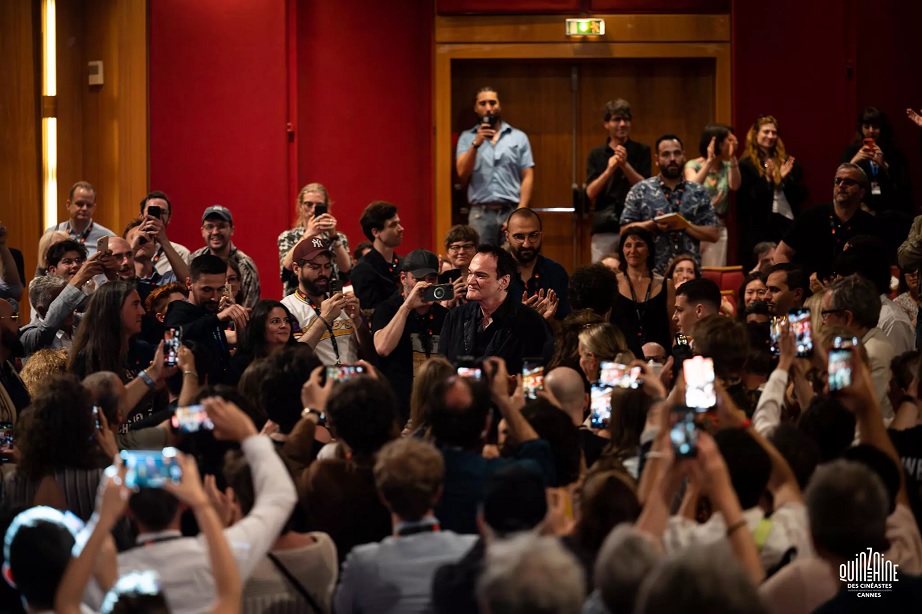"PART OF MY LOVE FOR DE PALMA CAME FROM THE POSSIBILITY OF GETTING INTO TROUBLE DEFENDING HIM"

"Quentin [Tarantino] — this may have changed — but about a month ago he was making a film, had something to do with filmmaking in the ’70s," Paul Schrader said on IndieWire’s Filmmaker Toolkit podcast last week. "And part of this, he’s going to use clips from movies from the ’70s, but he’s also gonna remake movies from the ’70s. And he asked me, ‘Can I redo the ending of Rollling Thunder?’ And I said, ‘Yeah, go for it. I’d love to see you redo the ending of Rolling Thunder.’ Who knows whether he actually will or not. But it was something that was tickling his imagination in a very Tarantino-esque way."
This week, Tarantino presented a mystery screening at the Cannes Film Festival that turned out to be Rolling Thunder. France 24's David Rich provides some details about Tarantino's subsequent Masterclass at Cannes:
A fixture of the Palme d’Or contest, [Marco] Bellocchio is yet to win a prize in Cannes – aside from the career award he picked up two years ago for his lifetime achievements. His lack of success here stands in stark contrast with that of another Cannes stalwart, Quentin Tarantino, who showed up for a masterclass on Thursday before an ecstatic crowd of several hundred, packed inside the Théâtre de la Croisette.The superstar director of “Pulp Fiction”, who won the Palme at his first attempt in 1994, is currently at work on what could be his final feature film. His Cannes talk came two months after the release of his book, “Cinema Speculation”, in which he recounts his first steps as a film buff and details his love of the movies.
Tarantino kicked off the talk with a surprise screening of John Flynn’s “Rolling Thunder”, an obscure movie about a Vietnam veteran pursuing the criminals who killed his family – which he introduced as “the greatest revenge flick of all time”. With its gun-blast violence, lyrical badmouth, and cathartic final bloodbath in a Mexican bordello, it had all the hallmarks of a Tarantino favourite.
The screening of “Rolling Thunder” was a chance for the filmmaker to reflect on his approach to on-screen violence, a subject he touched on in his book, describing how his mother would take him to the movies as a young boy and let him watch violent films – as long as the violence was contextualised and “understood”.
Morality should not dictate the aesthetics of a film, Tarantino argued at the Cannes talk. The most important thing is to “electrify the audience”, he added, quoting American director Don Siegel. He did, however, draw a red line at on-set violence against animals, noting that “killing animals for real in a film (…) has been done a lot in European and Asian films”. The taboo applied to insects too, he quipped, eliciting laughter from the audience.
“I'm not paying to see death for real. We’re here to pretend, which is why I can put up with all this violence,” he explained. “We’re just being silly, we’re just kids playing, it’s not real blood and nobody gets hurt.”
Tarantino also asserted his preference for edgy and divisive directors, as well as those – like Flynn from “Rolling Thunder” – who never got the credit they deserved.
“Everyone loves Spielberg and Scorsese, there was no question of me joining the club of the most popular guys, that’s not my style!” he said, echoing a theme he mined in his book, in which he detailed his love for Brian De Palma’s more divisive movies. “Part of my love for De Palma came from the possibility of getting into trouble defending him, sometimes to the point of coming to blows,” he added.
Touching on his last Cannes entry, “Once Upon a Time in Hollywood” (2019), Tarantino said his primary motivation for making the film was to “avenge” Sharon Tate, the actress who was brutally murdered by members of the ‘Manson Family’ in the 1970s, by imagining an alternative ending to the tragedy.
He was distinctly less chatty when quizzed about his new project, the forthcoming film “The Movie Critic”, billed as another ode to cinema. “I'm tempted to give you some of the characters’ monologues right now. But I’m not going to do that, no, no,” he teased the audience. “Maybe if there were fewer cameras.”
Tarantino has repeatedly suggested his tenth feature film is likely to be his last, based on his belief that filmmakers only have a limited number of good films in them. Whether or not he quits as a director, the conversation about movies will go on, he added, wrapping up the talk with a simple, “To be continued”.
Updated: Saturday, May 27, 2023 11:43 AM CDT
Post Comment | Permalink | Share This Post



